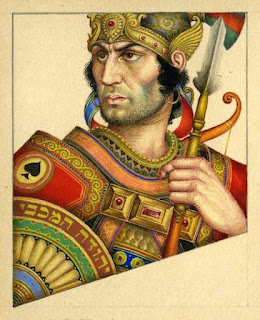 |
The Coffee Trader, published 2003,
with coffee beans, which play a big role
in the novel, as they do in my daily life. |
“It rippled thickly in the bowl, dark and hot and uninviting. Miguel Lienzo picked it up and pulled it so close he almost dipped his nose into the tarry liquid. Holding the vessel still for an instant, he breathed in, pulling the scent deep into his lungs. The sharp odor of earth and rank leaves surprised him; it was like something an apothecary might keep in a chipped porcelain jar.
“‘What is this?’ Miguel asked.”
So begins the novel
The Coffee Trader by David Liss. In May, 1659, coffee was completely unknown in Amsterdam, where Miguel Lienzo was a speculator in commodities. His first smell and taste of a bowl of coffee was off-putting, but as the narrative proceeds he comes to love the beverage, which came by sea from far-off Asian plantations, and was served in a few taverns by Turkish immigrants. Moreover, Miguel decides to engage in a highly risky plot to manipulate the price of this new product in an effort to reverse recent setbacks in his business dealings and to make a fortune.
The Coffee Trader is a very entertaining historical novel, which I read some years ago, and which I just reread. I love learning about the Dutch Golden Age, with its remarkable painters, developing business climate, and its exceptional freedom for people of all faiths. I’ve been fascinated for a long time by the history of the Portuguese secret Jews who returned to Jewish practice in Amsterdam at that time. Miguel Lienzo and the people in his life belong to this very prosperous and closed-in community — his own father had been a victim of the Portuguese Inquisition, and Miguel and his brother had fled to Amsterdam. It’s a novel of intrigue and deception, and Miguel claims that having lived as a secret Jew made him outstanding in the practice of deception.
 |
| "In the Tavern" (1660) by Jan Steen could be an illustration for many of the chapters of The Coffee Trader. |
 |
Portrait of a young Jewish man, 1648,
Rembrandt van Rijn (1606-1669) |
The novel's detail of the Dutch drawing rooms and kitchens, of the food and drink, of the taverns and low-life dives, and of the streets of Amsterdam is vivid. Descriptions of rich men, poor men, scoundrels, thieves, con men, good women, scheming women, dictatorial Jewish leaders, financial geniuses, and many other characters are wonderful. Author David Liss portrays much of the society of that era -- with occasional indirect references to a painter who works in the poorer Jewish neighborhood (you know who he was).
The individual speculators on the Amsterdam exchange depicted in the novel are fictitious, but the facts of the invention of market speculation and the popularization of coffee as a beverage and of "coffee taverns" that served it are real. The author, in fact, is a historian who was writing a dissertation on economic history of that era when he reapplied his learning to writing fiction about his subject matter. I'm glad he did it.
Also, I'm glad for coffee, though Miguel Lienzo at one point regrets his role in introducing it to his society. His thoughts:
"May the Holy One, blessed be He, forgive me for unleashing coffee upon mankind... . This drink will turn the world upside down." (p. 266)
Blog post © 2020 mae sander. Paintings from WikiArt. From Maefood.blogspot.com









